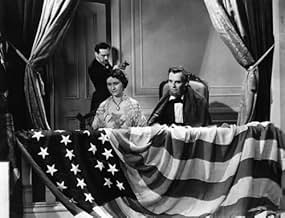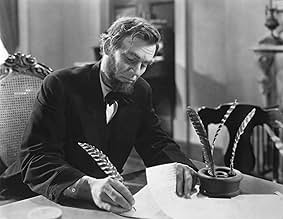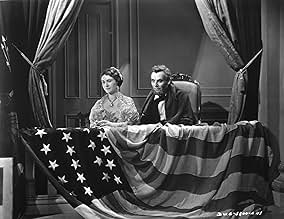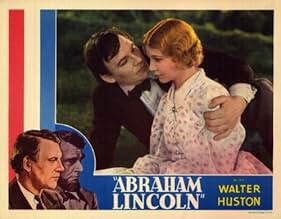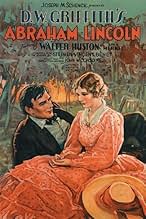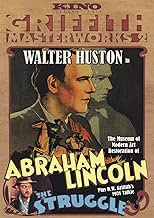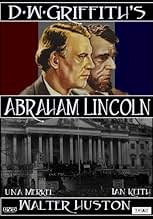IMDb-BEWERTUNG
5,7/10
1809
IHRE BEWERTUNG
Füge eine Handlung in deiner Sprache hinzuAn episodic biography of the 16th President of the United States.An episodic biography of the 16th President of the United States.An episodic biography of the 16th President of the United States.
- Auszeichnungen
- 4 wins total
William L. Thorne
- Tom Lincoln
- (as W.L. Thorne)
Edgar Dearing
- Armstrong
- (as Edgar Deering)
Jason Robards Sr.
- Herndon
- (as Jason Robards)
Cameron Prud'Homme
- John Hay - Secretary to the President
- (as Cameron Prudhomme)
James Eagles
- Young Soldier
- (as Jimmie Eagle)
Empfohlene Bewertungen
... "personally directed" by D. W. Griffith. Walter Huston stars as Lincoln, shown from his birth through his rough-and-tumble early years, his doomed romance with Ann Rutledge (Una Merkel), his marriage to the eccentric Mary Todd (Kay Hammond), and his election to the presidency, where he presided over the U. S. Civil War, during which he wrote the Emancipation Proclamation freeing the slaves, before being felled by an assassin's bullet.
Like most of Griffith's movies, this is a mixed bag of interesting choices, corny populism, and a rose-colored vision of the past. I was surprised by the opening of the film, set aboard a trans-Atlantic slave ship, featuring slave traders coldly discussing their remaining "inventory" as they toss a dead African overboard. As this was one of a few scenes missing its audio, I have a feeling it was often cut out during exhibition.
I was confused by Griffith's decision to cast E. Alyn Warren as both Stephen Douglas and Ulysses Grant: were there not enough qualified actors around? I liked seeing silent film stalwarts Hobart Bosworth and Henry B. Walthall as General Robert E. Lee and his attendant colonel, respectively. I liked Walter Huston as Honest Abe, and was surprised by how much he looked like the photographs of Lincoln in the last third of the film.
The biopic elements themselves are simplistic and hagiographic, and things seemed rushed, trying to tell his entire life story in 90 minutes. I was not a fan of Hammond as Mary Todd, and felt she dragged the proceedings down quite a bit.
Like most of Griffith's movies, this is a mixed bag of interesting choices, corny populism, and a rose-colored vision of the past. I was surprised by the opening of the film, set aboard a trans-Atlantic slave ship, featuring slave traders coldly discussing their remaining "inventory" as they toss a dead African overboard. As this was one of a few scenes missing its audio, I have a feeling it was often cut out during exhibition.
I was confused by Griffith's decision to cast E. Alyn Warren as both Stephen Douglas and Ulysses Grant: were there not enough qualified actors around? I liked seeing silent film stalwarts Hobart Bosworth and Henry B. Walthall as General Robert E. Lee and his attendant colonel, respectively. I liked Walter Huston as Honest Abe, and was surprised by how much he looked like the photographs of Lincoln in the last third of the film.
The biopic elements themselves are simplistic and hagiographic, and things seemed rushed, trying to tell his entire life story in 90 minutes. I was not a fan of Hammond as Mary Todd, and felt she dragged the proceedings down quite a bit.
Before writing this review I saw that publicity driven line about this film. Abraham Lincoln is a lot of things, but NOBODY ever accused him of being a great romantic. All I can say there is, Huh?
Abraham Lincoln is one of two sound films made by movie pioneer, David W. Griffith. It's also something of an atonement for Griffith who was accused fostering racism with his masterpiece silent work, The Birth of a Nation.
Maybe if Abraham Lincoln had been a better film it would have succeeded in being an atonement. It certainly had one of the best interpreters of Lincoln ever in Walter Huston. The film also in many ways looks like a newsreel of the Civil War era. Our image of that era and you can see it in Ken Burns documentary comes from Matthew Brady's still photographs. In crafting this and The Birth of a Nation, Griffith was heavily influenced by Brady's still photographs.
Lincoln's prarie years were better told in Abe Lincoln in Illinois and Young Mr. Lincoln. Griffith should have stuck to the war years and made it in fact the Lincoln family story. One thing that would have done is eliminated Una Merkel as Ann Rutledge. Una Merkel had many a good role as a wisecracking dame in modern films. But in Abraham Lincoln she's just awful as Lincoln's lost love Ann Rutledge. It's a miracle she had a career after this film and a good one.
Abraham Lincoln is one of two sound films made by movie pioneer, David W. Griffith. It's also something of an atonement for Griffith who was accused fostering racism with his masterpiece silent work, The Birth of a Nation.
Maybe if Abraham Lincoln had been a better film it would have succeeded in being an atonement. It certainly had one of the best interpreters of Lincoln ever in Walter Huston. The film also in many ways looks like a newsreel of the Civil War era. Our image of that era and you can see it in Ken Burns documentary comes from Matthew Brady's still photographs. In crafting this and The Birth of a Nation, Griffith was heavily influenced by Brady's still photographs.
Lincoln's prarie years were better told in Abe Lincoln in Illinois and Young Mr. Lincoln. Griffith should have stuck to the war years and made it in fact the Lincoln family story. One thing that would have done is eliminated Una Merkel as Ann Rutledge. Una Merkel had many a good role as a wisecracking dame in modern films. But in Abraham Lincoln she's just awful as Lincoln's lost love Ann Rutledge. It's a miracle she had a career after this film and a good one.
This being a presidential election year made me curious about this early talkie. I had seen it before but it's been a while and so I wanted to actually go through a diagnosis of the movie itself. So I dragged out an old A&E VHS made copy. Griffith had tackled the Booth assassination of Lincoln before in the silent Birth of A Nation. Here he did it in sound and Ian Keith is great as John Wilkes Booth: "S-I-C T-E-M-P-E-R T-Y-R-A-N-N-I-S... As he yells after he shoots Lincoln at Ford's theatre and jumps onto the stage. And Walter Huston is much more Lincolnesque than Henry Fonda would be ten years later. Also the scene where Lincoln & U.S. Grant are conversating over cigars was kind of priceless. Una Merkel is compelling in an early film performance as Lincoln's first wife Ann Rutledge.
This was Griffith's first sound film and he shows a somewhat uneasiness with the new medium but what director didn't in 1930. Griffith faired better than most. If you can look past the oldness of the film you'll see that this is pretty much a straight forward & accurate & well made(by 1930 standards) telling of the events of Lincoln's life. The sort of way Masterpiece Theatre would later tell stories episodically over many hours decades later. Griffith shows an aptitude for shooting that had already happened in the late silents of Hollywood. He makes quality use of the moving camera. Roving in and out of some scenes. The shot where the soldiers are fighting in trenches during the Civil War are similar to the same kind of shot Lewis Milestone did in All's Quiet On the Western Front which also came out in 1930. But even both of these films hark back to Griffith's own scene in Birth of A Nation where the South is battling the North and the Colonel jumps out of the trench to stoke a cannon.
This was not Griffith's first experiment with sound. He had shot some experimental dialogue scenes for his 1921 feature Dream Street. A short 1921 intro to Dream Street with Griffith talking up the film still exists as well as a 1930 sitdown interview with Huston promo-ing Abraham Lincoln. But Abraham Lincoln showed a 'newer' Griffith. Moving away from the static camera of which he was famous and adopting a more fluid style which was recently introduced by some German directors. Griffith even this late still liked old fashioned 19th century melodrama stories. Lincoln's life story is certainly a subject he could sink his teeth into. He had done bits and parts of Lincoln's life before particularly the Ford's Theatre scene in BoAN. Abraham Lincoln is Not necessarily a great film nor the best of 1930 but a very interesting foray into sound by a great film pioneer and like mentioned before a lot of the Lincoln life is covered quite surprisingly well.
This was Griffith's first sound film and he shows a somewhat uneasiness with the new medium but what director didn't in 1930. Griffith faired better than most. If you can look past the oldness of the film you'll see that this is pretty much a straight forward & accurate & well made(by 1930 standards) telling of the events of Lincoln's life. The sort of way Masterpiece Theatre would later tell stories episodically over many hours decades later. Griffith shows an aptitude for shooting that had already happened in the late silents of Hollywood. He makes quality use of the moving camera. Roving in and out of some scenes. The shot where the soldiers are fighting in trenches during the Civil War are similar to the same kind of shot Lewis Milestone did in All's Quiet On the Western Front which also came out in 1930. But even both of these films hark back to Griffith's own scene in Birth of A Nation where the South is battling the North and the Colonel jumps out of the trench to stoke a cannon.
This was not Griffith's first experiment with sound. He had shot some experimental dialogue scenes for his 1921 feature Dream Street. A short 1921 intro to Dream Street with Griffith talking up the film still exists as well as a 1930 sitdown interview with Huston promo-ing Abraham Lincoln. But Abraham Lincoln showed a 'newer' Griffith. Moving away from the static camera of which he was famous and adopting a more fluid style which was recently introduced by some German directors. Griffith even this late still liked old fashioned 19th century melodrama stories. Lincoln's life story is certainly a subject he could sink his teeth into. He had done bits and parts of Lincoln's life before particularly the Ford's Theatre scene in BoAN. Abraham Lincoln is Not necessarily a great film nor the best of 1930 but a very interesting foray into sound by a great film pioneer and like mentioned before a lot of the Lincoln life is covered quite surprisingly well.
This film was to be D.W. Griffith's big comeback production, and it did very well for "the old master." In fact, it was chosen as number two of the Ten Best Pictures of 1930 by The Film Daily, just below "All Quiet On The Western Front!" Sadly, due to the horrible condition of the available prints of this film, no really fair analysis can be made today. As with so many early talkies, Abraham Lincoln is now a sickly shadow of what it was in 1930. To begin with, it's original running time is listed at approximately 96 minutes. The version presented on Laserdisc runs 83 minutes.The film shows signs of wear and duping. The soundtrack is horribly distorted and, in several scenes, seems to be missing totally, replaced by terrible music from a stock library. Even so, if one can look past these things and take the acting style in the context of its time, one can see that Griffith had not lost his flair and would have probably continued directing had the fates (and probably Hollywood) not conspired against him. There are wonderful cinematic moments, reminiscent of some of his earlier triumphs. This is a film that cries out for restoration but, alas, there is most likely little or nothing left to restore. UPDATE: In 2008, KINO International released a DVD version of Abraham Lincoln that is far more complete than the old Laserdisc I reviewed from in 1998. While some soundtrack from the Prologue is still missing, KINO has made up for it by adding subtitles for the missing dialogue. Also, the picture quality is far superior to anything else available. It is evident that much effort went into making this forgotten film much more watchable and available!
No doubt about it, D.W. Griffith was one of the great directors of the early silent era. "Birth of a Nation," "Intolerance," "Orphans of the Storm," even a lesser-known film like "The Musketeers of Pig Alley" are all now regarded as classics. Unfortunately, for whatever reasons, Griffith couldn't maintain his success record, and, by the time he made his first all-talking film, "Abraham Lincoln," he was in the midst of a major slump that he just couldn't pull out of. The film is static, stilted, and moves at a snail's pace. Walter Huston, Ian Keith, Henry B. Walthall, and most of the rest of the cast all had distinguished careers in sound films, but here they are merely wasted, unable to cope with the tedious dialogue and Griffith's uncharacteristicly stiff direction. Worst-served of all, though, is Una Merkel, here in one of her first films. I can't believe that Anne Rutlidge could have been such a sugary simp as we're led to believe by her performance here, and her death scene is only exceeded for bathos by Ali McGraw in the last scene of "Love Story." In sum, a major disappointment, a good cast wasted, and a sad farewell form one of American film's true pioneers. Griffith described making this film as "a nightmare of the mind and nerves," and, unfortunately, that's just what it is, for him and us.
Wusstest du schon
- WissenswertesThis was D.W. Griffith's first sound film. Abraham Lincoln (1930) was also the first sound film about the Civil War which veterans of that war could view.
- PatzerIn both the Union and Confederate parades, the musicians play trombones with forward facing bells. During the Civil War, the bells faced backwards.
- Zitate
[death scene]
Ann Rutledge: I know the truth, dear. It's goodbye.
Abraham Lincoln: No, no, Ann, dear. You're not going to leave me. I won't let you!
Ann Rutledge: We must be brave, dear...
[looking up to the heavens]
Ann Rutledge: Don't take me away. Don't take me away! It's so dark and lonesome!
Abraham Lincoln: Ann, you mustn't let go.
Ann Rutledge: If they'd sing, I wouldn't be so afraid.
[a chorus of "Sweet By and By" swells up in the background]
Ann Rutledge: We will meet there, dear.
- Alternative VersionenOriginally, this film was color-tinted in sepia-tone, with blue for night scenes. These prints also had a prologue. Current public-domain prints are in black and white, minus the prologue with a shorter running time.
- VerbindungenEdited into General Spanky (1936)
- SoundtracksBattle Hymn of the Republic
(ca 1856) (uncredited)
Music by William Steffe
Lyrics by Julia Ward Howe (1862)
Played during the opening credits and often in the score
Sung by an offscreen chorus during a civil war scene
Top-Auswahl
Melde dich zum Bewerten an und greife auf die Watchlist für personalisierte Empfehlungen zu.
- How long is Abraham Lincoln?Powered by Alexa
Details
- Laufzeit1 Stunde 36 Minuten
- Farbe
- Seitenverhältnis
- 1.20 : 1
Zu dieser Seite beitragen
Bearbeitung vorschlagen oder fehlenden Inhalt hinzufügen

Oberste Lücke
By what name was Abraham Lincoln (1930) officially released in India in English?
Antwort
